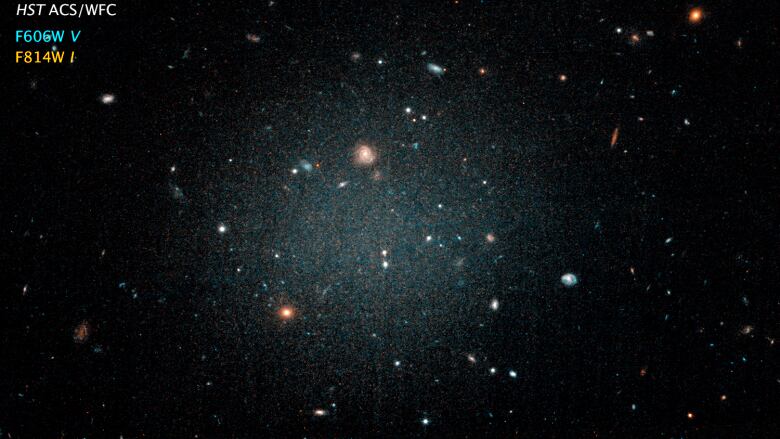Astronomers perplexed to find that distant galaxy has no dark matter
How can you build a galaxy without what has been thought to be the scaffolding?

A galaxy far, far away is perplexing astronomers not because of what it contains, but because of what it doesn't: dark matter.
GalaxyNGC1052, located about 65 million light-years from Earth,had been known to astronomers for decades. But upon further study, an internationalteam of astronomers was surprised to discover that it hadno dark matter, something that has been seen as crucial in the formation of galaxies.
"When galaxies beginto form, the first thing that forms we think is a little object of dark matter,"Pietervan Dokkum, lead author of the paper published in the journal Naturetold CBC News."Dark matter is the scaffolding on which galaxies are built,"
Using the University of Toronto's Dragonfly Telescope Array, researchers found that this galaxy belonged to a recently discovered class of galaxies called ultra diffuse galaxies, those that are large but extremely low-mass.The galaxy was then renamed NGC1052-DF2.
The scientists then usedlarger telescopes including the W.M. Keck Observatory in Hawaii andthe Hubble Space Telescope to do followup observations.

"How wouldyou get stars to form in this organized way over such a large part of space, unless there's enough gravity to pull all that stuff together?" Roberto Abraham, co-author of the paperand professor at the University of Toronto's department of astronomy and astrophysics, said.
"The answer is, I have no idea. There must be more than one way to form galaxies."
Dark matter mystery
If you look around andout at the stars, what you see and what astronomers can see using complex telescopes accounts for just five per cent of what is contained in the universe. Dark matter makes up roughly 27 per cent more, and dark energy another 68 per cent.
Neither dark energy nor dark matter is visible, however. So how do astronomers know they exist? They see how they interactwith the rest of the universe.Dark energy is believed to cause the acceleration of the expansion of the universe anddark matter causes something called strong gravitational lensing, or the bending of lightcaused by its massive gravity.
You see something like this, and you do sort of scratchyour head.- Roberto Abraham, University of Toronto
There have been galaxies that have formed containingmore dark matter than current galaxy formation theories suggest is possible.But there is no theory as to why dark matter would be missing in galaxies when it was thought to be their building block.
So what if the assumptions about dark matter are wrong?
"You see something like this, and you do sort of scratchyour head and you think there's something fundamentally wrong in our picture," Abraham said."But for now, I think the evidence for dark matter greatly outweighs the evidence against it. But you do need to keep an open mind."
The astronomers said they are hoping to use the James Webb Space Telescope, which will be the most powerful telescope ever built,now slated for launch in 2020, to do followup studies.
"The hunt is on," van Dokkum said.
The fact that astronomers are continually discovering unique objects is something that both van Dokkum and Abraham welcome.
"Often the case with the universe is, it's more surprising and more interesting than you think," Abraham said.












_(720p).jpg)


 OFFICIAL HD MUSIC VIDEO.jpg)
.jpg)



























































































